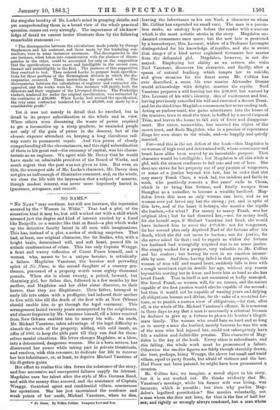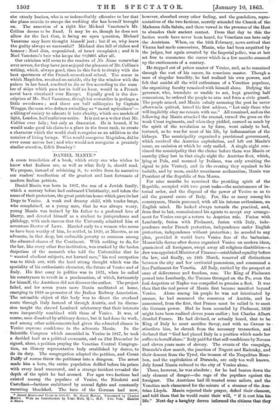NO NAME..
"No NAME " may continue, but will not increase, the reputation secured by the " Woman in White." That had a plot, of the
sensation kind it may be, but still worked out with a skill which aroused just the degree and kind of interest excited by a fraud like Roupell's, or a murder like that at Road—a plot which woke up the detective faculty latent in all men with imaginations. This has, instead of a plot, a series of striking surprises. That had, at least, one original character, the fat Italian, who, with a bright brain, determined will, and soft heart, passed life in artistic combinations of crime. This has only Captain Wragge, a faint and watery reflection of Count Fosco himself, and a woman who, meant to be a unique heroine, is artistically a failure. Magdalen Vanstone, the heroine and pervading
spirit of No Name, is the second daughter of a country gen-
tleman, possessed of a property worth some eighty thousand pounds. When she is about twenty, a petted, forward, but charming girl, her father dies, followed in a few months by her mother, and Magdalen and her elder sister discover, to their horror, that they are illegitimate. Their father, betrayed in early life into union with a profligate, had induced their mother to live with him till the death of the first wife at New Orleans should enable him to go through the legal ceremony. This arrangement lasted twenty years unsuspected by the neighbours, and almost forgotten by Mr. Vanstone himself, till a letter received front New Orleans enabled him to marry his wife. An uncle, Mr. Michael Vanstone, takes advantage of the legal difficulty to absorb the whole of the property, adding, with cold insult, an offer of 100/. to keep the girls pure till they can find for them- selves menial situations. His letter changes Magdalen, at a blow, into a determined, dangerous woman. She is a born actress, has discovered her power while taking part in private theatricals, and resolves, with this resource, to dedicate her life to recover her lost inheritance, or, at least, to deprive Michael Vanstone of his ill-gotten gains.
Her effort to realize this idea forms the substance of the story, and four successive and unexpected failures supply its interest. Magdalen uses her talent after the style of Mrs. German Reed, and with the money thus secured, and the assistance of Captain Wragge, theatrical agent and confidential villain, commences her operations. She has just ascertained the residence and weak points of her uncle, Michael Vanstone, when be dies,
* No Name. By Wilkie Collins. Sampson Low and Son.
leaving the inheritance to his son Noel, a character on whom Mr. Collins has expended no small care. The man is a poison- less snake, an analogy kept before the reader with a success which is the most artistic stroke in the story. Magdalen un- daunted commences once more ; but the new heir is protected by a housekeeper, Mrs. Lecount, widow of a Professor Lecompte distinguished for his knowledge of reptiles, and she is aware that danger of a kind never explained threatens her master from the defrauded girl. Magdalen, however, is not dis- mayed. Employing her ability as an actress, she visits Noel Vanstone, discovers his character, and finally, after a spasm of natural loathing which tempts her to suicide, and gives occasion for the finest scene Mr. Collins has ever described, a scene his true master Alexandre Dumas would acknowledge with delight, marries the reptile. Noel Vanstone prepares a will leaving her the £80,000, but warned by Mrs. Lecount of his wife's identity, dies of excitement and fear, having previously cancelled his will and executed a Secret Trust. and for the third time Magdalen commences her never ending task. Acting as parlour-maid, she gains admittance into the house of the trustees, tries to steal the trust, is baffled by a naval Corporal Trim, and leaves the house to fall sick of fever and disappoint- ment. Her sister, meanwhile, has married the object of the secret trust, and finds Magdalen, who in a passion of repentance flings her own share to the winds, and—is happily and quietly married.
For—and this is the art defect of the book—this Magdalen is no woman of high soul and determined will, whose conscience and heart have alike been seared by an immutable purpose. That character would be ; but Magdalen is all this while a girl, with the utmost readiness to fall into and out of love. She does not strive for her property out of any passion of vengeance, or sense of a justice beyond the law, but in order that she may marry Frank Clare, a weak lad, too indolent and facile to work, who positively resents a five years' exile in China, which is to bring him fortune, and finally escapes from Shanghai as a swindler, to become a wealthy landlord. Mag- dalen loves this man as only woman can love, and as no woman ever yet loved any but the strong ; yet, and in spite of this love, and of the heart it betrays, she marries the reptile she loathes,—for what ? For money to marry Frank, was her original idea ; but he had deserted her,—not for money itself, for she herself says, if Michael Vanstone had lived, she would have induced him to waste the £80,000; not for vengeance, for her second plan only deprived Noel of the fortune after his death, which she did not mean to hasten ; not for justice, for she never asked for that ; and to regain as widow the fortune her husband had wrongfully acquired was in no sense justice. She simply worked for a purpose, very valuable to Mr. Collins and his readers ; but having its root in no emotion measur- able by man. And then, having failed in that purpose, she, this woman of iron will and seared heart, suddenly falls in love with a rough merchant captain double her age, without any reason beyond his nursing her in fever, and loves him as hard as she has loved Frank. That in itself is not unnatural or badly managed. She loved Frank, as women will, for no reason, and the nature capable of the first passion would also be capable of the second ; but then it would not be capable of wasting years and defying all obligations human and divine, for th3 sake of a wretched for- tune, or to punish a narrow view of obligations,—for that, after all, is the whole of Mr. Michael Vanstone's offence. It is nonsense in these days to say that a man is necessarily a criminal because he declines to give up a fortune to please his brother's illegiti- mate family. The woman who could hate so hard and so long as to marry a man she loathed, merely because he was the son of the man who had injured her, could not subsequently have felt a sudden and Juliet-like passion. This character of Mag- dalen is the key of the book. Every other is subordinate, and this failing, the whole work must be pronounced a failure. Otherwise the smaller figures are fairly though sketchily drawn, the best, perhaps, being Wragge, the clever but small and timid villain, equal to petty frauds, but afraid of violence and the law. Had Fosco not been painted, he might have been pronounced a creation.
Mr. Collins has, we imagine, a moral object in his story, but it is not worked out. He thinks evidently that Mr. Vanstone's marriage; while his former wife was living, was innocent, which is possible; but then why pardon Mag- dalen's legalized prostitution ? She marries voluntarily, not a man whom she does not love, for that is the fate of half her sex, and rightly or wrongly always condoned,, but a man whom she utterly loathes, who is so indescribably offensive to her that she plans suicide to escape the wedding she has herself brought on. The assertion of a right like Michael Vanstone's Mr. Collins deems to he fraud. It may be so, though he does not allow for the fact that, it being an open question, Michael Vanstone may have thought himself just ; but if so, why leave the guilty always so successful? Michael dies full of riches and honour ; Noel dies, unpunished, of heart complaint ; and it is Noel Vanstone's heir who keeps the 80,000/. after all.
Our criticism will seem to the readers of No Name somewhat over severe, for they have just enjoyed the pleasure of Mr. Collins's writing, which, always good, rises in this book to rivalry with the best specimens of the French sensational school. The scene in which Magdalen, resolved on suicide, sits by the window with the poison in her hand, resolved to die or live according to the nuns • bar of ships which pass her in half an hour, would in a French novel have circulated over Europ3. Equally good is the des- cription of Mr. Noel Vanstone, though his cowardice is perhaps a little overdrawn ; and there are half soliloquies by Captain Wragge, the man who defines swindling as "moral agriculture"— a tilling of society to educate it into charity, which are models of light, London, half-malicious satire. It is not as a writer that Mr. Collins ever fails ; but only as dramatist. He is bound, if he would make good his claim to a place in the front rank, to create a character which the world shall recognize as an addition to the number of living beings. Who would recognize Magdalen, did he ever come across her ; and who would not recognize a precisely similar creation, Edith Donabey ?































 Previous page
Previous page